- Home
- Janette Rallison
The Wrong Side of Magic
The Wrong Side of Magic Read online
Begin Reading
Table of Contents
About the Author
Copyright Page
Thank you for buying this
Feiwel and Friends ebook.
To receive special offers, bonus content,
and info on new releases and other great reads,
sign up for our newsletters.
Or visit us online at
us.macmillan.com/newslettersignup
For email updates on the author, click here.
The author and publisher have provided this e-book to you for your personal use only. You may not make this e-book publicly available in any way. Copyright infringement is against the law. If you believe the copy of this e-book you are reading infringes on the author’s copyright, please notify the publisher at: us.macmillanusa.com/piracy.
To Norton Juster, who wrote my favorite childhood book, The Phantom Tollbooth. Also to Michael Kuykendall, my fifth-grade teacher, who read the book to our class. You opened up a world of magic to so many people!
1
SOMETIMES MAGIC SNEAKS up on a person like a sudden rainstorm, or bad news, or a mugger wearing really quiet shoes. That’s what happened to Hudson Brown. He was an average eighth grader, with average brown hair that usually needed to be cut and average brown eyes that didn’t always pay attention to his teachers. He lived in an average bedroom that needed to be cleaned and had average friends—many of whom also needed to be cleaned.
In short, Hudson was the type who hadn’t believed in magic for years. Truth be told, magic hadn’t believed in Hudson for even longer, but boys are often getting tangled in trouble, and Hudson was no exception. Except his trouble involved trolls, wizards, and several other things that wanted to kill him.
It started with a cat. Many problems do, which is why dogs, mice, and grumpy old men don’t like them.
Hudson’s little sister, Bonnie, however, adored them. Cats, that is, not grumpy old men. When she found a stray kitten cowering in the bushes near their house, it was love at first drag-a-furry-black-creature-out-of-the-junipers-so-she-could-tell-what-it-was sight. Bonnie brought the kitten inside, fed her tuna casserole, and named her Sunshine.
She begged their mother to let Sunshine be their official pet. (Bonnie occasionally captured bugs and made them unofficial pets.)
Perhaps their mother didn’t turn the cat away because she was tired of Bonnie bringing crickets and spiders inside, some of which later escaped into unknown parts of the house. Or perhaps their mother relented because Sunshine actually liked her tuna casserole, whereas Bonnie and Hudson only poked at it whenever it was put on their plates.
The important thing was, Sunshine stayed.
The cat spent the next week pouncing, purring, and attempting to change everyone’s hearts into soft, kitten-shaped objects. Then just as abruptly, Sunshine got sick and hardly ate for two days. She lay among the unmade covers of Bonnie’s bed in a limp, pathetic heap.
On the third morning, Hudson woke to the sound of Bonnie in the kitchen pleading with their mother. “Can we take her to the vet? I’ll pay for it. I’ve got eighteen dollars.”
Dishes clanked about in the sink noisily. Mrs. Brown made a daily heroic attempt to keep the kitchen clean. “A vet wouldn’t pet your cat for eighteen dollars. Maybe we should bring her to a shelter and let them take care of her.”
“But I love Sunshine. I’ll earn more money and pay you back.”
Mrs. Brown let out a grunt. “Honey, vet bills can be thousands of dollars. Besides, I hardly have the time to take you to the doctor when you’re sick. I can just imagine what my manager would say if I asked for time off for a stray cat.”
“Pleeeeease?” Bonnie insisted. No one could drag out a word like Bonnie could.
The dishwasher snapped shut. “I’ve got to get ready for work. Wake up Hudson and tell him to get a move on, or you’ll both be late for school.”
Hudson pulled himself out of bed and staggered into the shower. By the time he walked into the kitchen, his mother was picking up her jacket and purse, about to go out the door.
Mrs. Brown was tall, with curly brown hair that she pinned up when she went to work. She was pretty in a motherly way, no-nonsense in every other way. She never wore the sorts of clothes you saw on department-store mannequins. No frills or bling. And her philosophy on shoes was: If a woman couldn’t comfortably run after a bus in them, there was no point in buying them.
Bonnie stood by the table, the kitten in her arms and a worried frown on her face.
Mrs. Brown walked over to Hudson and gave him a kiss on the cheek. “You have a good day at school.” Next, she went to Bonnie, kissed her on the head, and smoothed down Bonnie’s hair. “The cat will probably get better on her own.”
Bonnie didn’t answer, just petted Sunshine’s ears.
Their mother sighed and gave Bonnie an extra kiss. “You have a good day at school, too.”
As their mother slipped on her jacket, she asked her usual morning question. “And why do you need a good education?”
Bonnie gave the standard answer. “So we can have jobs where we don’t have to listen to people complain all day.”
“That’s right, baby.” Mrs. Brown gave them one last wave before she headed out the door. Ever since Mr. Brown’s Marine unit had deployed overseas, she’d worked in customer service at a department store.
Bonnie opened a can of wet cat food and sat down at the table with Sunshine cradled in her arms. Using one of her doll spoons, she tried to slip food into the kitten’s mouth. Mostly she just managed to get fish-smelling mush all over Sunshine’s fur.
Hudson walked to the cupboard and took out a cereal bowl. “Bonnie, what are you doing that for?”
“She’s got to eat something or she’ll die.”
And if Bonnie didn’t eat breakfast, she’d be hungry later. He didn’t tell her this. She didn’t listen to him when he said anything that sounded vaguely parental. Which made Hudson’s job twice as hard. His mom had put him in charge of making sure Bonnie got to school on time, walking her home afterward, and helping her with her homework.
He sat down, placed a bowl in front of Bonnie, and poured her a bowl of generic Cheerios. Their mom never bought the real kind. She bought the cheap brand in the big bags that were shoved on the bottom shelf of the cereal aisle. Generic might not be so bad if she bought the generic Froot Loops, but she said those had too much sugar. She only bought cheap and healthy stuff, which was never going to be a good combination.
Hudson poured the milk on his and Bonnie’s cereal, then dumped spoonfuls of sugar on the floating circles. They bobbed around his bowl, and he pretended they were fleeing from his spoon with their little mouths opened in O’s of horrified surprise. “No one escapes the spoon of death,” he told Bonnie, and shoveled a dripping pile from his bowl.
Bonnie ignored him and kept trying to feed Sunshine. By the time they had to leave for school, she’d managed to get cat food on the table, the floor, and all over the kitten’s black fur. “Well,” he said, “at least if she licks herself off, she’ll get some nutrients.”
“We have to get money for a vet.” Bonnie’s eyes were big and full of eight-year-old innocence. She had the sort of adorable little-girl face you saw on the cover of parenting magazines. “We could rob a bank,” she said hopefully.
“No, no, we couldn’t.” Hudson took the breakfast dishes to the sink. He had fifty-five dollars stashed in his sock drawer. Money he’d earned last summer mowing lawns. He was saving up for a gaming system. “I can give you ten dollars.”
Bonnie blinked at him sadly. She knew it wasn’t enough.
“Okay,” he said, “twenty.”
“Won’t Sunshine need some me
dicine?”
“I’ll ask around and see if anyone needs yard work done.…”
“I could mow lawns, too,” she said, just as enthusiastic about this possibility as about robbing banks.
“You’re too young. Lawn mowers eat eight-year-olds.”
Bonnie laid a dish towel in their mother’s biggest mixing bowl and set the kitten inside to rest. Hudson didn’t point out that this new sleeping arrangement wouldn’t make their mother happy.
He picked up his backpack. “If your cat dies in that bowl, I’m never eating out of it again.”
Bonnie set the bowl near the front door and cooed at the kitten. “We’ll take you to the vet after school, Sunshine. ’Cause I’m robbing a bank on the way home.”
Hudson let out a sigh. The money in his sock drawer was in serious danger. Sometimes it was easier to give in to Bonnie than to argue with her or keep her out of trouble.
Then again, maybe he could put some of her cuteness to good use. It was, after all, her best asset. Hudson turned the idea around in his mind. “I know how we can make some money,” he said. “After school, we can go to a busy intersection somewhere, wash people’s car windows, and then ask for a donation for your sick kitten.”
Cute kid plus sick kitten: irresistible. And much better than taking up a life of crime.
Bonnie brightened at the idea. “Mom will be so surprised.”
Yeah. And mortified, too. Their mother expected many things from her children. Panhandling wasn’t on that list.
Bonnie ran to the laundry room and came back with a squeegee and an empty bucket. “We can do it right after school. There are lots of cars around then.”
While Bonnie swung the bucket back and forth, Hudson tucked the squeegee into her backpack. “Mom probably shouldn’t know about this.”
They headed down the sidewalk toward the school. The early-November morning was whispering of winter in a way that made you keep your hands in your pockets and wish for afternoon sun. Hudson didn’t mind. Winter could go ahead and shout, for all he cared. Cold meant Thanksgiving was almost here, and his dad had said he would be home for it.
Before long, Hudson and Bonnie came to Charlotte Fantasmo’s yard. Her real last name was Smith, but everyone at school called her Fantasmo because her dad was Mr. Fantasmo, Magician Extraordinaire. Extraordinaire in this case meaning weird.
He wore brightly colored corduroy pants and loud Hawaiian shirts, and every once in a while he fixed people with a stare so complete it felt like a bushy-eyebrowed X-ray. He claimed to be an actual wizard, banished from the magical land of Logos.
It was one thing to say that sort of thing when you were onstage, busy turning balloons into handkerchiefs, but he also talked that way when he came to pick up Charlotte from school.
And this from a man who wasn’t even a big-name magician. Mostly he performed at kids’ birthday parties. At the back-to-school night, he put on a show right in the parking lot—producing oranges and radishes and then a dazed-looking sparrow from his hat. When the crowd got big enough, he took a few bows and handed out flyers advertising his rates.
Mrs. Brown said the whole I’m-a-wizard-from-Logos thing was part of his act—his persona—but that didn’t explain why half the time Charlotte also talked like she’d just taken a taxi from Crazyville.
In the four months since Charlotte had moved to town, she hadn’t made any friends. You could say something perfectly normal like, “Hey, what’s up?”
She’d spout off, “The ceiling. The price of gasoline. Two-thirds of the letters in the word UPS.” And she wasn’t joking.
This morning Charlotte lay on her stomach on the lawn, fingering through the grass. Her long red hair was pulled into a ponytail at the top of her head, and she wore a pair of faded jeans and a man’s plaid flannel shirt.
She might have been pretty if she tried. Well, pretty in an elfish sort of way. That’s the impression you got from her upturned eyes, pixie nose, and pointed chin. She looked like she’d just wandered out of Santa’s workshop and would momentarily be returning to make toy sleighs for good little girls and boys.
She saw Hudson and Bonnie and then waved at them.
Bonnie waved back enthusiastically. She just liked the fact that an eighth grader knew who she was. Hudson took hold of Bonnie’s jacket sleeve and pulled her forward. “We don’t have time to stop and talk.”
It was too late. Charlotte got up and came toward them, bouncing with excitement. She held up a clover. “Look, it’s the second four-leaf one I’ve found since I moved to Houston. I can’t believe nobody else picked it first.”
Bonnie leaned closer for a better look. “What are you going to do with it?”
“Dip it in silver,” Charlotte said, as though the answer should be obvious. “So it can protect against wizard spells.”
“Oh,” Bonnie said. “I found one once, and my mom put it in between the pages of a book to dry.”
Charlotte tilted her head until her ponytail rested against her shoulder. “What good does that do?”
“Well,” Hudson said, smiling, “wizards haven’t ever attacked our bookcase, so it must be doing its job.” He nudged Bonnie in the direction of the school. “We’ve got to go, or we’ll be late for school.”
Charlotte’s eyes widened. “Oh, right. I forgot—school.” She turned and ran back to her house. “Thanks for reminding me!” She dashed inside, leaving the screen door swinging wildly.
What sort of person forgot they had school in the morning? Hello, had she not done this every morning for, like, nine years? Hudson walked on, shaking his head.
A few minutes later, Charlotte caught up to them, breathless because she’d been running. She slipped her arms into a bright blue sweater that was too big. No one said anything for a moment. Hudson was thinking of their after-school plans, his mind busy sifting through ideas to bring in more of those elusive dollar signs.
“So,” Charlotte said, “do you really care about the weather?”
“What?” Hudson asked.
“The weather. You know, clouds, wind, that sort of thing.”
“Why would I care about that?”
Charlotte let out a humph of triumph. “I knew it. I knew people didn’t really care about the weather. Well, you know, not unless there’s a drought or something.”
Hudson stared at her, wondering if it was worth it to ask the next question. “Charlotte, what are you talking about?”
“That’s what I’m trying to figure out,” she said. Then nothing else.
He knew he shouldn’t have asked.
Bonnie gazed up at the sky. Her bucket banged against her legs as she walked. “Is there something wrong with the weather?”
“Pollution. Acid rain. The occasional hurricane.” Charlotte fiddled with her sweater, turning the cuffs inward instead of outward.
Bonnie cocked her head and didn’t let the subject drop. “So why did you ask about the weather?”
“My dad said that when people here don’t know what to talk about, they talk about the weather. But I don’t think I should, because no one actually cares about the weather. Why not talk about something people care about?”
Bonnie nodded in agreement. “I never talk about the weather.”
“Let’s talk about soda pop,” Charlotte said. “I saw three soda pop commercials last night, so it must be a hot topic.”
Hudson looked at her to see if she was serious. He didn’t know why he bothered. It’s not like you could tell anything from her expression. She always looked either intrigued or distracted.
“That doesn’t make them hot topics,” he said. “That makes them advertisements.”
“Right,” Charlotte agreed. “The soda companies want to get their message out. It sort of makes me feel sad—all those commercials. So many people urgently want to educate us about laundry detergent, cell phone coverage, car insurance—I can barely keep it all in my mind.”
“You’re not supposed to…” he started, and then figured
she was being sarcastic about it anyway.
“Soda pop,” Charlotte went on. “How exactly is it connected to happiness? I mean, do they pour a little bit of happiness into each can, or does that only come in the liter sizes?”
“Probably just the liter sizes,” he said.
Her eyebrows scrunched together. “I must not be buying the right brand, then.”
“Okay…” Hudson said, and then didn’t know what else to say. This was most likely why people talked about the weather. It was hard to mess up a conversation about the temperature.
Bonnie walked closer to Charlotte. “Aren’t you happy?”
The words hung in the air. The question was too personal. Anyone else would have brushed off the subject with a laugh. Charlotte looked at the lawn they were passing and sighed. “Sometimes.” She didn’t sound very convincing.
“You probably need a kitten,” Bonnie said.
“We could give her ours,” Hudson said.
Bonnie scowled and swung the bucket at him, trying to hit his leg. “No, we couldn’t.”
Instead of commenting on kittens, Charlotte paused in front of a patch of clover as though she wanted to search through it, then she resumed walking beside Hudson. “Would you willingly face danger to save someone important, even if you didn’t know them?”
He shrugged. “How much danger?”
“Wizards. Dragons. Soldiers. Possibly giants—”
“Nope.”
Charlotte frowned. “What if the person you need to save was really important?”
“Still, nope.”
Charlotte’s frown stayed firmly fixed on her lips and was joined by a dip in her eyebrows. “Do you think I could find someone that brave?”
Hudson let out a snort. “You don’t need someone who’s brave. You need someone who’s stupid. And most people aren’t that stupid.” He didn’t bother asking for details about who Charlotte thought needed to be saved from dragons, wizards, and possibly giants. None of those things existed, so it didn’t matter.
The group was close enough to school now that other people converged on the sidewalk, heading their way. Hudson spotted his best friend, Trevor, walking toward the parking lot. He was thin with dark hair and an unmistakable slouch that proclaimed, I’m only here because I have to be.

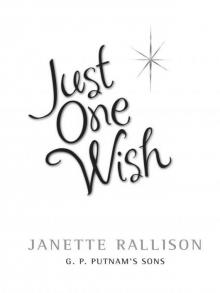 Just One Wish
Just One Wish My Fairly Dangerous Godmother
My Fairly Dangerous Godmother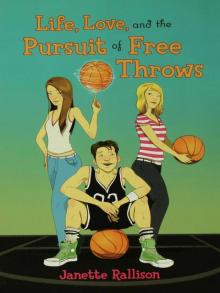 Life, Love, and the Pursuit of Free Throws
Life, Love, and the Pursuit of Free Throws How to Take the Ex Out of Ex-Boyfriend
How to Take the Ex Out of Ex-Boyfriend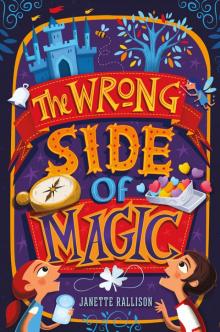 The Wrong Side of Magic
The Wrong Side of Magic Playing the Field
Playing the Field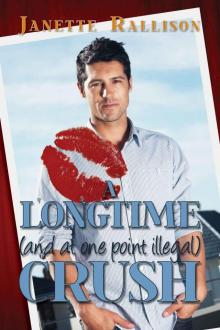 A Longtime -And at One Point Illegal- Crush
A Longtime -And at One Point Illegal- Crush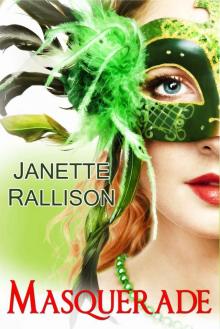 Masquerade
Masquerade Typeractive Tales: A Collection of Clean Short Fiction
Typeractive Tales: A Collection of Clean Short Fiction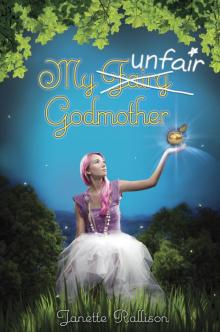 My Unfair Godmother
My Unfair Godmother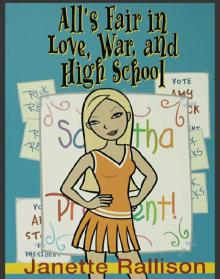 All's Fair in Love, War, and High School
All's Fair in Love, War, and High School My Double Life
My Double Life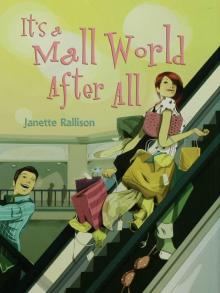 It's a Mall World After All
It's a Mall World After All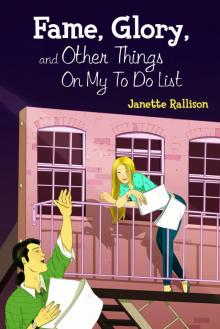 Fame, Glory, and Other Things on My to Do List
Fame, Glory, and Other Things on My to Do List The Cowboy and the Girl Next Door: (A Clean, Enemies to Lovers Romance) Wyle Away Ranch Book 1
The Cowboy and the Girl Next Door: (A Clean, Enemies to Lovers Romance) Wyle Away Ranch Book 1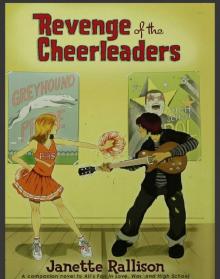 Revenge of the Cheerleaders
Revenge of the Cheerleaders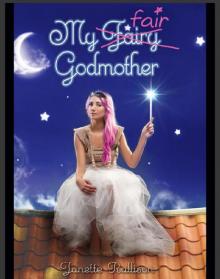 My Fair Godmother
My Fair Godmother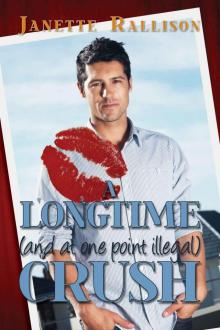 A Longtime (and at one point Illegal) Crush
A Longtime (and at one point Illegal) Crush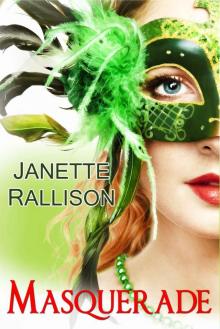 Masquerade: a romantic comedy
Masquerade: a romantic comedy How I Met Your Brother (Power of the Matchmaker)
How I Met Your Brother (Power of the Matchmaker) Valentine's Day Collection (A Timeless Romance Anthology Book 19)
Valentine's Day Collection (A Timeless Romance Anthology Book 19)